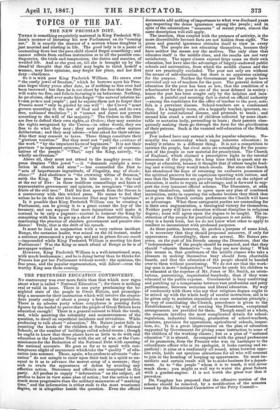TOPICS OF THE DAY.
THE NEW PRUSSIAN DIET.
THERE if; something exquisitely maternal in King Frederick Wil- liam's manner of lecturing his new Parliament on its "coming out." It is exactly the manner of a matron whose daughter is just married and starting in life. The good lady is in a panic of contending fears lest the poor child should forget something ; and cannot refrain from endless instruction as to all the possible con- tingencies, the trials and temptations, the duties and maxims' of wedded life. And so she goes on, till she is brought up by the dreadful thought that the child may begin to think herself a woman, may have opinions, may forget her place, and her first duty—obedience.
So it is with poor King Frederick William. He crows over " the costly jewel of freedom," which he bestows upon his Prus- sian lieges thirty years after date, as if nothing so fine ever had been bestowed ; but then he is cut short by the fear that the Diet will make too free, and falls to lecturing it on behaviour. Nothing, he proclaims, shall ever make him forget "the natural relation be- tween prince and people" ; and he enjoins them not to forget that Prussia must "only be guided by one will " : the Crown "must govern according to the law of God and the land, and its own free, unbiassed resolution " ; it "cannot and dares not govern according to the will of the majority." The Orders in the Diet are free to defend their own rights, as Orders; they may exercise the rights recognized by the Crown—in other words, they are free to do what they may ; they may petition—after mature deliberation; and they may advise—when asked for their advice. Also they may consent to taxes. These things constitute their "glorious vocation." But they must not "peril the existence of the work" "by the impatient haste of beginners." It is not their province "to represent opinions," or "play the part of represen- tatives of the people." "That," says the King, naively, "is wholly un-German.
Above all, they must not attend to the naughty press : the press despises "this jewel " — it "demands outright a revo- lution in church and state" — has counselled the Diet to "acts of importunate ingratitude, of illegality, nay of disobe- dience ! " And obedience is "the crowning virtue of freemen " saith the King. The press is his bete noire ; it is the toad at the ear of Eve : in these insidious counsellings and hints at representative government and opinion, he recognizes "the evil fruits of the evil tree." Half his first speech from the throne is it controversy with this wicked press. He seems to- feel that unless he be on the alert his innocent Diet may have " opinions."
Is it possible that King Frederick William can be creating a Parliament, can be giving it to a great extent the key of the treasury, and can suppose that mere injunctions will make it content to be only a pageant—content to humour the King by conspiring with him to get up a show of free institutions, while continuing the practice of absolute government and passive obe- dience? Truly, that is the drift of his speech. • It must be read in conjunction with a very curious incident. Ronge, the sectarian leader, was seized on the 2d instant, under a sentence pronounced a year ago, and put in prison for one ?with —impounded while King Frederick William is meeting his first Parliament! Was the King as much afraid of Rouge as he is of newspaper writers ? However, King Frederick William is a well-intentioned man, with much bonhommie ; and he is doing better than he thinks for. Prussia has got her Parliament without revolt : the opinions, the free press_, and the popular representation, will follow—even the worthy King sees them coming.


























 Previous page
Previous page